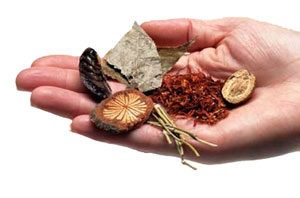|
|
Herbal medicine: how does it work?
Being familiar with the different forms of herbal supplements can help you
make the best choice for your personal use.
 Healing with herbs
is the oldest therapy in the world and remains the medicine on which many
countries, including China and India, largely rely. Herbalists in the western
tradition combine the examination methods of conventional medicine with a "mind and body" approach to diagnosis and treatment. The results can be
remarkable. Healing with herbs
is the oldest therapy in the world and remains the medicine on which many
countries, including China and India, largely rely. Herbalists in the western
tradition combine the examination methods of conventional medicine with a "mind and body" approach to diagnosis and treatment. The results can be
remarkable.
The underlying aim of all herbal medicine is to restore the body to a state in
which it
is better able to heal itself. The right herbs can promote health by correcting
imbalances within the body. In this �holistic� approach, the aim is not simply
to
relieve your complaint, but also to improve your overall health and vitality by
encouraging your body to work as efficiently as possible.
A herbal practitioner will usually do more than prescribe herbs for an illness.
As part of the treatment he will also make recommendations about changing your
diet
and lifestyle and reducing the amount of
stress in your life. The goal is to
prevent, as
well as to treat, illness.
Herbal medicine has been in use since prehistoric times and is known to
have flourished in ancient Egypt, Greece and Rome. It has enjoyed a renaissance
in
the west in the last century. In controlled laboratory experiments, scientists
have
documented how a number of herbs traditionally used by herbalists have important
medicinal properties. The herbs in question include
garlic for combating heart
disease
and St John�s wort
(Hypericum perforatum), which is used to treat
depression.
With such scientific reassurance, there has been increasing interest in
herbal medicine among the pharmaceutical manufacturers Infact, they have been
scrutinizing �phytochemicals� � the hundreds of thousands of substances
contained
within the plant world � in their quest to find new drugs.
HOW DOES IT WORK?
 The approach to healing with herbal medicine is different in many ways from that
of
conventional medicine. It aims to work with the
body, to gently nudge it into
balance
rather than attempting to actively tip the scales. For example, in the case of a
fever,
conventional doctors advise taking drugs such as aspirin or Paracetamol to
suppress
the temperature. However, herbalists take the view that a fever can sometimes be
helpful, not harmful � it is one of the body�s natural defense mechanisms. Many
harmful bacteria and viruses are known to be compromised and even killed by a
higher than normal body temperature. The herbal medicine approach is to
encourage
a cleansing sweat so that the fever is not suppressed. At the same time, the
fever is
treated to prevent it from becoming dangerously high. The approach to healing with herbal medicine is different in many ways from that
of
conventional medicine. It aims to work with the
body, to gently nudge it into
balance
rather than attempting to actively tip the scales. For example, in the case of a
fever,
conventional doctors advise taking drugs such as aspirin or Paracetamol to
suppress
the temperature. However, herbalists take the view that a fever can sometimes be
helpful, not harmful � it is one of the body�s natural defense mechanisms. Many
harmful bacteria and viruses are known to be compromised and even killed by a
higher than normal body temperature. The herbal medicine approach is to
encourage
a cleansing sweat so that the fever is not suppressed. At the same time, the
fever is
treated to prevent it from becoming dangerously high.
Similarly, in the case of food poisoning, vomiting and diarrhoea are
considered by herbalists to be effective protective mechanisms. They allow the
body
to quickly rid itself of any harmful organisms in the digestive tract. Unlike
conventional medicine, which would recommend drugs to halt diarrhea and
vomiting,
herbal medicine aims to control these symptoms by recommending medicines that
inhibit absorption from the digestive tract. The object is to make it more
difficult for
any harmful agent to enter and circulate throughout the bloodstream. As in
conventional medicine, the patient would be encouraged to drink plenty of
liquids to
prevent dehydration; however, the diarrhoea or vomiting would not be completely
suppressed.
BENEFITS OF WHOLE HERBS
 Herbs are nutritional foundation nutrients and good
alternative medicine to nourish the body's deepest and most basic elements.
Medicinal herbs have been used safely and effectively since the time of recorded
history, for an endless list of reasons from health, healing,
weight
loss/gain/maintenance, to survival and more. Herbs can offer the body nutrients
it does not always receive, either from a poor diet, or environmental
deficiencies in the soil and air. They are great body balancers that help
regulate body functions. Herbs are nutritional foundation nutrients and good
alternative medicine to nourish the body's deepest and most basic elements.
Medicinal herbs have been used safely and effectively since the time of recorded
history, for an endless list of reasons from health, healing,
weight
loss/gain/maintenance, to survival and more. Herbs can offer the body nutrients
it does not always receive, either from a poor diet, or environmental
deficiencies in the soil and air. They are great body balancers that help
regulate body functions.
The orthodox medical approach is to identify and isolate the �active ingredient�
within
a plant, then to artificially synthesize it for formulation into a drug.
However,
herbalists believe that it is important to prescribe the whole herb: the balance
of
substances within a whole herb or a mixture of whole herbs works as a
combination
to heal � in other words, that the sum of the parts is greater than the whole.
The
belief is that the components of a herb will balance one another � one part can
modify the potentially harmful effects caused by another part.
A herbalist would argue that, in much the same way as
vitamins,
minerals
and other nutritional supplements can never replace whole foods, an isolated
active
ingredient is a crude and poor substitute for the gentler healing power of the
complete herb. What is more, the whole herb is safer because the dose it
delivers of
any one active ingredient will be much lower than if the ingredient were
isolated and
formulated into a drug.
Your body views plants as food and utilizes them very efficiently, taking almost
all the valuable active principles and organic compounds right into your body's
cells. In contrast, your body does not recognize synthetic
drugs as food and
often utilizes only 5 to 10% of what you take in, leaving the rest to float
around in your bloodstream and cause unpleasant side effects.
Herbal supplements are available in several convenient forms and are
safe and effective when used according to package directions; they are not
mysterious at all, just a natural, healthy aid to achieving optimum health.
Related Links
|
|
|
|
|









